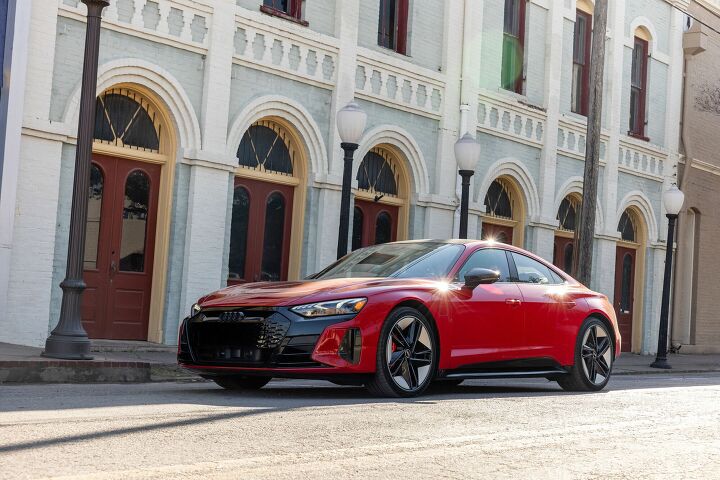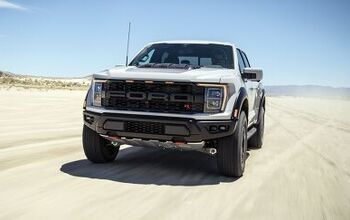Audi Sees More Battery Recalls, Porsche Likewise Impacted

Audi’s all-electric e-tron subbrand continues suffering from battery issues, with the company recently issuing a recall for the GT sedan and its zestier RS variant. The issue is that the high-voltage batteries equipped to the models might short circuit, posing a fire risk to owners and whatever they’ve parked their EV next to. The recall report stipulates that Porsche warned Audi of the possibility of “thermal events” after realizing that some Taycan models were suffering from battery defects.
The two models are mechanically similar and have identical battery modules, so Audi and its supplier (LG Energy Solution Wrocław) were effectively obligated to look into the matter. The companies are now recommending that owners only charge the vehicles up to 80 percent capacity to help mitigate fire risks.
Recalls have been on the rise generally in recent years with system integration issues outpacing faulty parts. As the industry continues pivoting toward “software defined vehicles,” we’ve seen an uptick in recalls and complaints pertaining to electrical issues. However, there’s often a fair bit of overlap now that so many vehicle components have been turned into drive-by-wire units or have to be networked together.
This has also resulted in battery issues due to the fact that an electric vehicle's state of charge and how it regulates charging is handled by the computer. In the past, we’ve seen automakers tweak an EV’s code via over-the-air updates to expand its range or mitigate charging when there’s a problem. While the practice opens a gigantic can of worms in regard to who actually is in control of the second most expensive thing you’ve ever bought, it likewise showcases just how much damage some bad software can do to modern automobiles.
Porsche and Audi seem to be suffering from both mechanical and software defects and opted to split their recalls into two groups. The first group doesn’t have a solution, hence the company suggesting customers don’t fully charge their vehicles as a safety precaution. It is supposed to affect an extremely small number of the total involved in the recall. For Audi, that was said to be about 1 percent of 1,013 units.
The other issue only impacts a couple dozen vehicles. But it was said to require a battery replacement in all instances due to assumption that they’re suffering from a mechanical defect. These cars were singled out after the company parsed through the battery data that’s transmitted from the vehicle back to the manufacturer.
Our guess is that Volkswagen Group doesn’t want to install any more batteries than it absolutely has to and is just trying to limit repairs to a software update on as many Porsche and Audi models as possible. The symptoms of both recalls are so similar that it seems unlikely that they’re not closely related. If we were to speculate, there’s a chance that the vehicles getting new batteries are simply too large of a risk to try and solve with a software flash.
At any rate, the companies involved have said they will continue to study telematics data to determine whether or not batteries will need to be replaced. Customers that do have to have work done in relation to this will be able to bring it in for repairs free of charge under the recall.
All impacted models appear to stem from the 2022-2023 model years with the defect appearing quite similar to the e-tron SUV recall from December. In that recall, the EVs were likewise using batteries manufactured by LG Energy Solution and were similarly at risk of thermal runaway. Even the solution was exactly the same. Audi planned on implementing a software update that more closely monitored the battery system and would advise drivers not to charge their vehicle beyond 80 percent if something appeared off.
Sadly, the company didn’t think it would have a comprehensive solution in place until fall of 2024 — which does not bode well for the recently recalled Porsche Taycan and Audi e-tron GT.
[Image: Audi]
Become a TTAC insider. Get the latest news, features, TTAC takes, and everything else that gets to the truth about cars first by subscribing to our newsletter.

A staunch consumer advocate tracking industry trends and regulation. Before joining TTAC, Matt spent a decade working for marketing and research firms based in NYC. Clients included several of the world’s largest automakers, global tire brands, and aftermarket part suppliers. Dissatisfied with the corporate world and resentful of having to wear suits everyday, he pivoted to writing about cars. Since then, that man has become an ardent supporter of the right-to-repair movement, been interviewed on the auto industry by national radio broadcasts, driven more rental cars than anyone ever should, participated in amateur rallying events, and received the requisite minimum training as sanctioned by the SCCA. Handy with a wrench, Matt grew up surrounded by Detroit auto workers and managed to get a pizza delivery job before he was legally eligible. He later found himself driving box trucks through Manhattan, guaranteeing future sympathy for actual truckers. He continues to conduct research pertaining to the automotive sector as an independent contractor and has since moved back to his native Michigan, closer to where the cars are born. A contrarian, Matt claims to prefer understeer — stating that front and all-wheel drive vehicles cater best to his driving style.
More by Matt Posky
Latest Car Reviews
Read moreLatest Product Reviews
Read moreRecent Comments
- Lou_BC Near $100,000 price tag That isn't unusual when looking at full-sized higher end pickups.
- Akear They will sell about 15,000 annually. Nothing to see here.
- Kcflyer Sounds like an impressive vehicle on paper and I genuinely hope it turns out to be great. My guess is, however, it will a) sell poorly for a number of reasons starting with the price , b) not be competitive to ice trucks in doing real hauling and towing but excel as an all around daily hauler for family and commuting. c) wind up in scrap yards well before an ice vehicle would because of pricey or obsolete battery concerns.
- ToolGuy I like trucks. I like electricity. Can I drive this vehicle indoors?Also, picture #21 appeals to me.
- MaintenanceCosts This would be my favorite trim of Mach E if it weren't for the dumb-looking rear spoiler. I think the white wheels are dope, it's available in a great dark green, and there's an option to delete the graphics and stripes.

































Comments
Join the conversation
Here
I am shocked a VAG product has problems with its' electrical system.